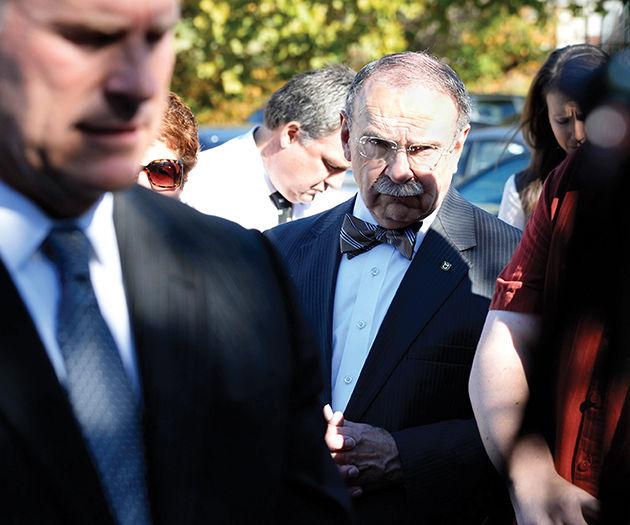Former Texas A&M President R. Bowen Loftin stepped down from his position as University of Missouri Chancellor Monday, as student concerns over MU’s handling of several high-profile racial slurs boiled over.
Loftin’s resignation followed the resignation of Tim Wolfe, MU System President, by a few hours. The resignations come days after students protested the way MU’s administration handled a series of racist campus incidents that included a racial slur made to the Missouri Students Association president in September and a swastika made out of human feces on the walls of a dormitory in October.
Jonathan Butler, a graduate student at the University of Missouri, along with a group called Concerned Student 1950, went on a seven-day hunger strike. Starting Tuesday, Nov. 3, protests continued Saturday when members of the Missouri football team announced they would refuse to play until Wolfe was removed from office.
Kyle Norris, general manager of KCOU, the Missouri student radio station, said the football team’s involvement served as a catalyst in the process leading up to Wolfe’s resignation.
“If the football team gets behind a cause, that cause is going to win,” Norris said. “Football has that much influence on what’s going on, because it’s such a money grab … The fact of the matter is the football players are student athletes. They have every right to protest just as much as every other student on campus and if they want to make this stand, they have a right to do it.”
Elizabeth Loutfi, editor-in-chief of The Maneater, Missouri’s campus newspaper, said while Wolfe’s resignation was a result of recent protests, Loftin’s resignation has been demanded by protesters since this time last year.
“There were a lot of student groups on campus who decided this time last year that administrators weren’t as effective as they wanted them to be at responding to protests and discrimination on campus,” Loutfi said.
Loutfi said when a student group on campus called MU for Mike Brown formed in 2014 in response to the death of Brown, it took campus administration four months to respond to the organization’s efforts.
“The way [administration] responded was by holding an open forum where they invited students to come talk about their grievances and their problems with administration, but that’s really all that came from administration,” Loutfi said. “So what it boils down to is that they wanted Loftin out, because they felt he was responsible for the way administration was responding.”
In a news conference Monday, Wolfe said he hopes his resignation will help the campus heal.
“It is my belief that we stopped listening to each other. We didn’t respond or react, we got frustrated with each other,” Wolfe said. “And we forced individuals like Jonathan Butler to take immediate action and unusual steps to effect change. This is not, I repeat, not the way change should come about. Change comes from listening, learning, caring and conversation and we have to respect each other enough to stop yelling at each other and start listening.”
Norris said the main goal of the protests is to encourage the university to take action against discrimination and racial injustices.
“One of the concerns of the protesters is that there’s been a lot of dialogue, but no action,” Norris said. “And they’re right. There’s been no action that’s really going to affect campus for the next four years. So the thing is, after today — this is just the first step.”
Carter Koen, biochemistry major at the University of Missouri, said most students on campus are in support of Butler’s and the football team’s efforts.
“I think the biggest thing is that it’s starting conversations that need to be had in a lot of aspects because people are so quick to shut down the conversation, and they don’t ask questions and try to understand other people’s experiences because we are so quick to turn a blind eye,” Koen said.
Loutfi said from what she’s seen in protests and news conferences, the goal for the next step of the protests is to garner student input of who is elected to lead the university and the MU System.
“They want this dialogue to continue, especially throughout changes in leadership and administration,” Loutfi said.
In a news release from the MU System, Loftin said he will transition from his position as chancellor to a job in research at the university, effective at the end of the year.
“I sincerely wish it was different, but events are such that the best course of action for the university at this time is for me to resign,” Loftin said in the release.
Loftin has been MU’s chancellor since February 2014.
In a MU System news release, the Board of Curators announced a new series of initiatives for the next 90 days to address the campus’ racial climate, including the appointment of a Chief of Diversity, Inclusion and Equity Officer and a review of MU System policies in relation to staff and student conduct.










